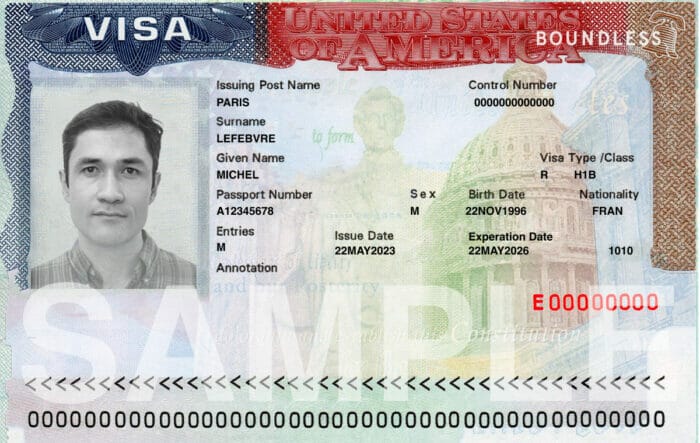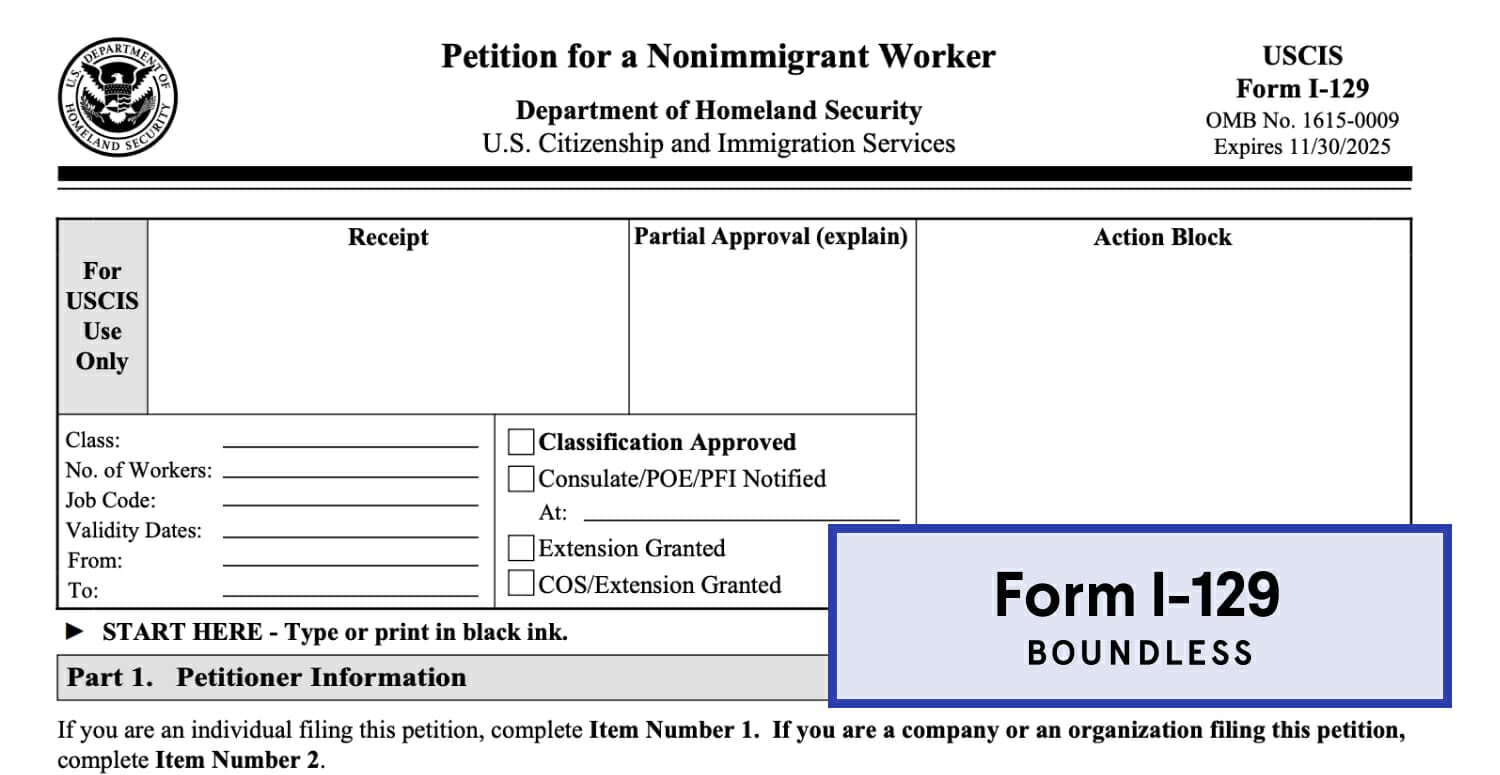The H-1B Visa, Explained
Understanding the H-1B Visa for working in the United States

What is the H-1B visa?
The H-1B visa is a nonimmigrant work visa that allows U.S. employers to hire foreign workers with specialized skills to work in the United States for a specific period of time. Typically, the roles require a bachelor’s degree or equivalent. Occupations that qualify for the H-1B visa are typically in fields such as technology, finance, engineering, architecture, or more.
Important:
U.S. Citizenship and Immigration Services (USCIS) announced it would hold a second lottery for the H-1B visa program for FY 2024. Learn more here!
H-1B visa eligibility
In order to be eligible for the H1B visa, you will need:
- A valid job offer from a U.S. employer for a role that requires specialty knowledge
- Proof of a bachelor’s degree or equivalent experience in that field
- Your employer must show that there is a lack of qualified U.S. applicants for the role

Understanding the H-1B visa cap
Before you can enter the United States under the H-1B classification and begin work, you may need to register with U.S. Citizenship and Immigration Services (USCIS) and be selected to apply. Because there is a lot of demand for this visa, there is a limited number of visas that can be issued each year.
To learn more about the H-1B visa cap and how to register for the lottery, check out Boundless’ detailed H-1B cap lottery guide.
RELATED ARTICLES
How much does the H-1B visa cost?
The cost to register for the H-1B lottery is $10.
If the applicant is selected for an H-1B visa, the employer will then have to pay $780 to file Form I-129 (Petition for Nonimmigrant Worker), or $460 (in the case of small employers and nonprofits).
Beyond Form I-129, the costs can vary, depending on the size of the company, costs to expedite the application, whether or not the H-1B applicant is changing employers, and attorney fees.
The H-1B visa process
Once you have been selected to apply for the H-1B visa, your employer can begin the process by filing a petition on your behalf.
To do this, your employer will need to submit a Labor Condition Application (LCA) to the Department of Labor (DOL) for Certification. The purpose of the LCA is to confirm that your employer will pay you the same wage as other similarly qualified workers in the same geographic area and that your working conditions will not affect other employees.
Once the LCA has been certified by the DOL, your employer will have to complete Form I-129, Petition for a Nonimmigrant Worker, and file both the LCA and the I-129 to USCIS, along with any fees and additional documentation. These other documents may include evidence of your education, any training certificates or professional membership documents if relevant, your resume, a confirmation letter of employment, a letter of support, and any necessary fees.
If your Form I-129 is approved, then there are two options for you, depending on whether you are in the United States already or not.
If you are within the United States on a different visa category, you must wait until your H-1B visa status becomes active in order for you to start working.
If you are outside the United States, then you will need to apply for consular processing. To do this, you will need to complete Form DS-160, which will take around 90 minutes to fill in. You will also need to pay the application fee and schedule an interview at a U.S. embassy or consulate near you.
Once you have arranged an interview, you will need to bring documents such as:
- Your passport. This should be valid for at least six months beyond your intended date of entry to the United States
- A printout of the confirmation page from your Form DS-160.
- A copy of your approved I-129 petition and your I-797 approval.
- Receipts showing you have paid your application fees.
- A passport-sized photo of you that follows U.S. State Department requirements.
During your interview, you may be asked questions about yourself, the job, your experience, the employer, and your travel history.
What’s next
Currently, H-1B visa holders may apply for a green card. However, there may be lengthy delays. This means that any children who moved with you may “age out” of their visa status, which is tied to your H-1B visa. Under the current system, if they turn 21 before their green card is approved, they will need to apply for another visa to stay, such as a student visa. The Biden administration may remove this, and also make it easier for dependents of H-1B visa holders to gain work authorization.
If you’re planning to transition from an H-1B visa to a family or marriage green card, Boundless can help you navigate the process. Learn more about how Boundless can help you make the switch smoothly.
H-1B FAQs
The H-1B lottery electronic registration for FY 2025 will run from March 6 to March 22, 2024. NOTE: The dates vary each year, so be sure to check USCIS’ information page for the exact dates for the upcoming fiscal year.
If you’re a business sponsoring H-1B employees, Boundless can help you navigate the process. Learn more here!
To see if you are eligible to file for an H-1B visa, you can check your USCIS online account. The account will show the status of your application. The employer or attorney who registered for the H-1B should also get a notification in an email telling them if their registration was selected in the H1B visa lottery.
Yes, premium processing is available for the H1B visa. To request premium processing, you will need to submit Form I-907, Request for Premium Processing Service, and pay the filing fee to USCIS. You can do this at the same time as you file your Form I-129 petition.
If you have already filed your petition, you can request premium processing at a later date by sending your form to the same service center as your original Form I-129.
Having a valid visa allows you to go to a U.S. port of entry and request entry to the U.S.. If you leave the U.S. for travel and return, as long as your H-1B visa is still valid, you may be able to be admitted on H-1B status. You may wish to bring evidence of your employment or your visa validity with you to present at the border.
If your H1B visa is subject to the cap, you will need to register online first. You should keep in mind that being selected in the lottery allows you to apply for a visa for the following financial year.
If you are selected, you and your employer can petition for a H-1B visa on your behalf. You can expect to have around 90 days to apply for your visa, but the filing period and location will be on your H-1B Registration Selection Notice from USCIS. You can apply for your visa up to six months before your visa start date.
If your H-1B visa is under the cap and you have been selected to apply for a visa, your selection notice will let you know which USCIS address you can file your application at. If the H1-B visa cap does not apply to you, for example, if you are being employed by an institute of higher education, then you can file your application at the USCIS California service center.
Your H1B visa is generally valid for three years, and can usually be extended for up to six years. To do this, your employer will need to complete and file Form I-129 again on your behalf, along with any supporting documents, and pay the filing fee.
The H-1B visa is a dual-intent visa, which means that yes, you can apply for a green card. Find out more about how Boundless can help you through the process.
Any U.S.-based employer can sponsor the H-1B visa. As long as the employer has an IRS Tax ID Number, they can register to file a petition on your behalf.
Because the H-1B visa is an employment-based visa and you will need your employer to file certain forms for you, you will need a job offer before you are eligible to apply for the H-1B visa.
No. In June 2020, President Trump issued an executive order stopping H-1B visas from being processed. That executive order has now expired, and you can now continue preparing your H-1B visa application.
Yes, your spouse and any unmarried children under the age of 21 may be able to accompany you on H-4 visas. Learn more about the H-4 process in Boundless’ guide.
The H-1B visa is valid for three years and can be extended for up to six.
It depends. If your spouse holds an H-4 visa, they may be able to apply for employment authorization if you, the H-1B visa holder, is on track to get a green card. Learn more in our H-4 guide.
The government sets a cap on the number of H-1B visas it issues each year. Currently, the cap is 65,000 visas per fiscal year, with 20,000 additional visas available for those who have a master’s degree or higher.
The H-1B1 is a U.S. nonimmigrant visa for nationals of Chile and Singapore who work in specialty occupations. The annual cap for H1B1 visas is 6,800 — 1,400 from Chile and 5,400 from Singapore.
The employer filing the H-1B petition must show the Department of Labor (DOL) proof they will pay the employee the prevailing wage or the employer’s actual wage, whichever wage is higher. The prevailing wage is the salary paid to workers in similar occupations in the same geographic area, while the actual wage is the salary the employer pays to its workers in similar positions.
If you are on an H-1B visa and lose your job due to layoffs or an economic downturn in the United States, you will immediately fall “out of status.” However, there is a 60-day grace period from the time you were terminated until you’re required to return to your home country. Additionally, H-1B workers may be able to switch employers without losing their visa status under certain conditions. Learn about what to do if you lose your job while on a work visa.
Depending on the complexity of your case, or if you simply want additional peace of mind during the extension process, it may be helpful to enlist an immigration lawyer’s help for your H-1B extension application. Lawyers can help you navigate the extension forms and H-1B requirements from start to finish. If you’re not sure whether an immigration lawyer is the best option for your H-1B extension, Boundless put together a detailed guide on when to hire an attorney for your visa process here.
Boundless guides
Related Information
Ready to cross immigration off your to do list?
Get in contact with us to get a demo of Boundless and see how we can help you with your strategy to hire international talent.
"*" indicates required fields